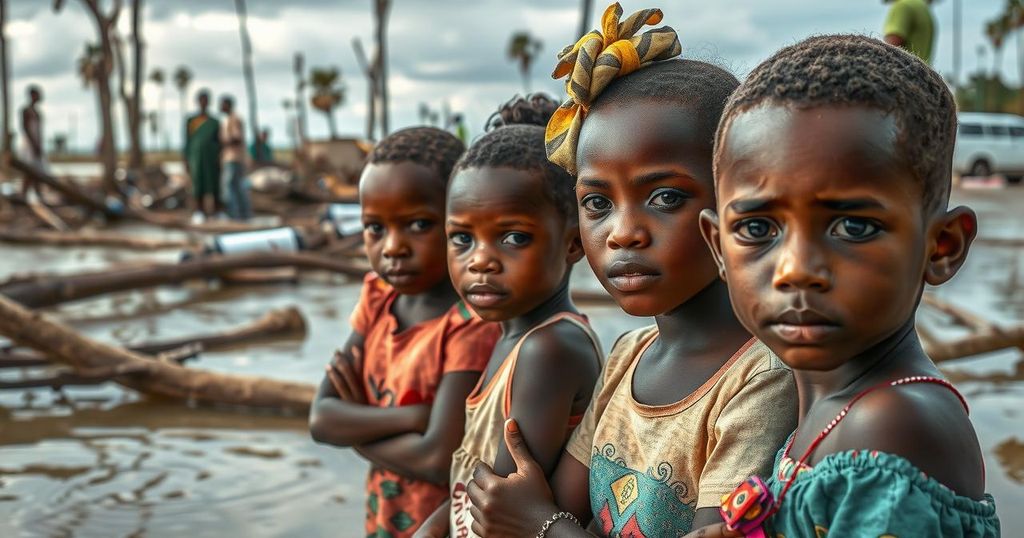Devastation from Cyclone Chido in Mozambique: Nearly 90,000 Children Impacted
Tropical Cyclone Chido has severely affected northern Mozambique, impacting approximately 90,000 children. With over 35,000 homes destroyed and significant damage to schools and health facilities, the humanitarian crisis has escalated, necessitating urgent relief efforts by UNICEF and other organizations. The region’s ongoing challenges include conflict and food insecurity, further complicating recovery efforts.
Tropical Cyclone Chido has inflicted significant damage upon northern Mozambique, with the United Nations Children’s Fund (UNICEF) reporting that approximately 90,000 children have been affected by this natural disaster. The cyclone struck the Cabo Delgado province, bringing destructive winds and severe rains that have devastated homes and essential infrastructure. Recent assessments indicate that over 35,000 residences have either been destroyed or damaged, displacing numerous families and impacting 174,000 individuals overall. The storm has not only demolished primary and secondary educational facilities, with 186,000 classrooms reported as destroyed, but has also led to damage at 20 health facilities. Close to the city of Pemba, the cyclone wreaked havoc, demolishing roofs, damaging infrastructure, and disrupting electricity and communication networks for thousands.
The ongoing plight of children and communities in Mozambique is exacerbated by pre-existing crises, including conflict, disease outbreaks, and droughts. Mary Louise Eagleton, UNICEF’s Representative in Mozambique, remarked on the compounded difficulties faced by children: “Mozambique is considered one of the most affected countries in the world by climate change…” This statement highlights the vulnerability of children who were already enduring multiple life-threatening circumstances prior to Cyclone Chido.
The humanitarian response is already underway, with UNICEF cooperating alongside other UN agencies, local governments, and NGOs to provide emergency assistance. Following seven years of conflict that has displaced 1.3 million people, the cyclone has further strained the already fragile recovery of communities. Cyclone Chido has also impacted the provinces of Nampula and Niassa, leaving thousands without electricity and jeopardizing clean water availability. The threat of a deteriorating cholera outbreak looms amidst these challenges, prompting the World Health Organization (WHO) to deploy experts to conduct health assessments.
Within 48 hours of the cyclone’s impact, the UN refugee agency UNHCR initiated relief efforts, distributing essential supplies to over 2,600 affected individuals in Pemba. Preliminary assessments indicate that approximately 190,000 individuals are in urgent need of assistance, as many rural areas are reported to have sustained significant damage with nearly 10,000 homes destroyed. UN Secretary-General António Guterres has reiterated the UN’s readiness to provide further support in response to this calamity. The humanitarian response is compromised due to limited resources, although $4 million has been allocated for immediate relief efforts. In light of predictions indicating that 3.3 million Mozambicans may face critical food insecurity next year, the World Food Programme intends to enhance its support to those impacted by the cyclone.
Cyclone Chido has also left its mark on Mayotte, a French overseas territory, causing fatalities and infrastructure destruction. Similarly, regions in southern Malawi have faced strong winds and rains due to the storm, with significant damages reported. These interconnected crises underscore the urgent need for coordinated humanitarian efforts to assist vulnerable populations across the affected areas.
The devastation caused by Cyclone Chido highlights the urgent and ongoing challenges faced by Mozambique as it grapples with the effects of climate change. The country has been identified as one of the most impacted worldwide, experiencing numerous emergencies prior to this cyclone. Prolonged conflict in Cabo Delgado province has resulted in mass displacements and a fragile humanitarian situation. Cyclone Chido has exacerbated pre-existing vulnerabilities, placing additional strain on already overwhelmed communities and infrastructure. The need for effective humanitarian aid and international support is more critical than ever as many individuals, particularly children, are left to navigate the aftermath of this disaster.
In summary, Cyclone Chido has had a profound impact on Mozambique, affecting approximately 90,000 children and leading to significant destruction of homes, schools, and health facilities. The humanitarian response is crucial amidst ongoing challenges related to climate change and conflict in the region. With projections of escalating food insecurity, the coordinated efforts of UN agencies and local partners are essential to alleviate the suffering of those affected and support their recovery. The continued assessment and provision of humanitarian assistance will be vital as recovery efforts unfold.
Original Source: news.un.org




Post Comment